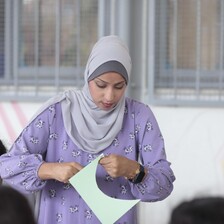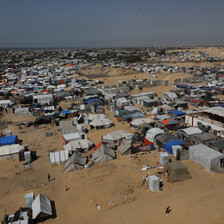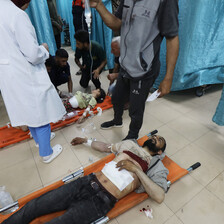The Electronic Intifada 12 May 2024

People who had been displaced repeatedly are being forced to flee once more.
APA imagesA sense of camaraderie had developed in Rafah.
People who had been displaced from other parts of Gaza had headed toward its southernmost city. They had set up tents next to each other.
For months, they shared food and had countless conversations. They had reassured each other in an extremely stressful situation.
Israel’s invasion of Rafah has changed everything.
People who lived in Rafah before the current war have been forced to flee. People who had fled to Rafah since the war began have been forced to flee again.
Rafah has become like a ghost town.
Vendors can no longer be seen on the streets.
Food and drink is harder to find.
Hospitals have ceased functioning.
Sondos Farhat, 45, is a mother of six from Shouka, a neighborhood in eastern Rafah. She had been hoping that “the world would not allow the Israeli army to invade Rafah.”
All such hopes evaporated a few days ago when Israel circulated leaflets in parts of Rafah, ordering an evacuation.
“We were very afraid when we read that paper,” Sondos said.
Sondos and her family started to gather some belongings. They decided not to quit Rafah immediately but to wait until the following day.
Israel’s bombing of surrounding areas that night was “very violent,” Sondos said. “The sky turned red from the explosions.”
“We waited until the morning to escape this hell,” she said.
Sondos and her family set out for al-Mawasi, another part of southern Gaza.
They walked on the roads along with huge numbers of other people.
Her children asked questions about how long they would be away and how they would adjust to living in a tent.
“I couldn’t find answers,” Sondos said. “I want to return and find my home intact.”
“I want to go back with all my children,” she added. “I never want to lose anyone.”
“An ugly new war”
Muhammad Saqr, 26, is from the city of Khan Younis.
He has long been trying to arrange treatment for his mother, who has a spinal complaint which causes considerable pain.
Muhammad and his mother were about to leave Gaza for Egypt via the Rafah crossing, when Israel seized the area.
Israel’s invasion of that area occurred shortly after Hamas had announced that it would accept a ceasefire proposal.
Although Israel had already agreed to a similar proposal, it rejected the offer of a truce. Israel pushed ahead with the Rafah invasion despite appeals against such an offensive from the US and the European Union.
Muhammad described the invasion of Rafah as “an ugly new war.”
“The world used to say that Rafah was a red line, that there would be a disaster if a big military operation was carried out there,” he said.
“Unfortunately, that was all just media talk. The world never saved us.”
Maher Awad, 55, is from Gaza City. He has been uprooted numerous times since the war began.
The invasion of Rafah – where he had moved – has meant that he now has to seek new accommodation for his family once again.
Maher ran a carpentry workshop but no longer has a job.
He had been saving so that his children could get married. “We have lost our children’s future,” he said.
He is asking the kind of questions that have been on everyone’s lips in Rafah lately.
“Why didn’t the world stop them [the Israelis]?” he said. “No one has defended us.”
Ruwaida Amer is a journalist based in Gaza.





